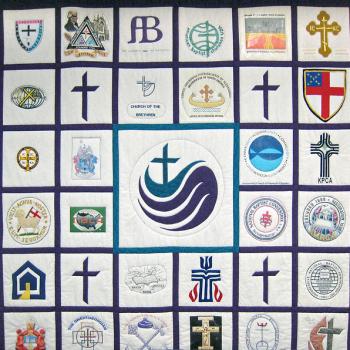The blog Mission Work, which focuses on faith, work, and economics, is hosting a series on the Lutheran perspective on these issues, also known as the doctrine of vocation. Every few days for several weeks, it will post some reflections by Rev. Adam Roe, a pastor in the Lutheran Congregations in Mission for Christ (LCMC). I’ve been asked to respond to what he has to say. His first post is about the Priesthood of All Believers.
From Rev. Adam Roe, God is in all of life: #1 of a series:
“I am a pastor, but we are all ministers.”
Most readers have probably heard the above statement, or some variation of it, in their denominational circles. As a United Methodist in the process of transferring to a newer Lutheran association, much of my credentialing work has been focused on both the nature and function of the pastoral office as expressed in the Book of Concord. A student quickly realizes that within Protestantism generally, and Lutheranism specifically, one cannot answer questions about the pastoral/priestly office unless s/he also has some understanding of the priesthood of all believers.
Rev. Roe focuses on how, thanks to the Lutheran doctrine of the Priesthood of All Believers, lay people too can be “ministers,” breaking down the distinctions between clergy and laity.
Fair enough, but I would take it further and in a slightly different direction. The Priesthood of All Believers is, indeed, another name for the doctrine of vocation. But it doesn’t mean that all believers are pastors (as Rev. Roe agrees) or even ministers is the sense of occupying themselves in pious exercises all the time (though they can).
The point is, Christians don’t HAVE to be doing religious things all the time in order to fulfill their callings from God. By doing ordinary physical, mundane work–growing crops, working in a factory, keeping busy in an office–they can be loving and serving their neighbors, and God can be working through what they do to give His gifts. As Rev. Roe says, God really is in all of life.
Pastors do occupy a special office and have a special calling, which they receive from the church, as God works through them to proclaim His Word and convey His sacraments.
But pastors–or ministers, or preachers, or clergy, or whatever you want to call them–are, strictly speaking, NOT priests, except in the same sense that the laity are. A priest is someone who offers sacrifices. (Now Roman Catholic ministers are called priests, because they are believed to offer up Christ’s Body in the Sacrament as a sacrifice for the living and the dead. Orthodox ministers are also called priests, I believe for the same reason. Anglicans still use that title, though I don’t think they keep the theology behind it.)
Lutherans and Protestants in general do not call their clergy priests, since Christ offered Himself as the sacrifice once and for all on the Cross. Thus Jesus is our true priest and our true sacrifice.
There is no further need for a sacrifice for sin. Pastors proclaim this Good News, and so can laity, but pastors are authorized by the church to act on its behalf to preach the Gospel, to forgive sins in the name of that Gospel, to provide spiritual care for God’s people, to Baptize in God’s triune name and to distribute Christ’s Body and Blood, the two concrete manifestations of the Gospel.
But though we do not have to sacrifice for our own sins, the New Testament says that we are to present our bodies as living sacrifices (Romans 12:1; and see 1 Peter 2:5). Jesus tells us that following Him means denying ourselves “daily” and taking up our Cross, which is an instrument of sacrifice (Luke 9:23). This happens in vocation, whenever we deny ourselves–which is a kind of self-sacrifice–for our neighbors. When a wife denies her self and takes up her Cross by submitting to her husband in love and service to him, and when a husband denies himself and takes up his cross by “giving himself up” for his wife, in love and service to her (Ephesians 5:22-23). Or a father comes home from work, exhausted from giving good service to his customers and making a living for his family–he has presented his body as a living sacrifice.
Pastors are also priests when they deny themselves and take up their Cross in their calling, when they wear themselves out dealing with problems at church, when they feel themselves stretched too thin, when they love and serve their parishioners even when those parishioners resist their care for them. Pastors engaged in that kind of sacrifice are carrying out their priesthood, just as their parishioners are. And Christ, our great high priest, is in all of these priesthoods.
















